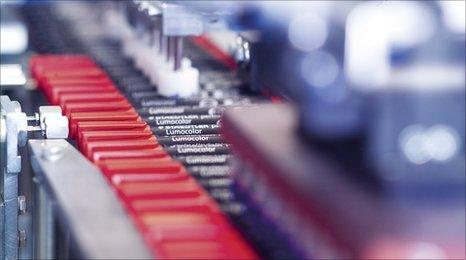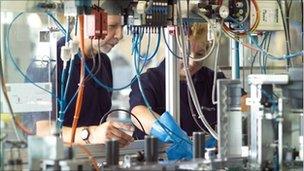Staedtler and Faber-Castell's productive pencil rivalry
- Published

The proximity of Staedtler and Faber-Castell encourages innovation at both firms
The ancient city of Nuremberg, steeped in medieval and Nazi history, is home to a cluster of fiercely competitive pen and pencil manufacturers whose survival is driven by innovation.
Staedtler and Faber-Castell are both part of the Mittelstand, the backbone of German industry, made up of thousands of small and medium-sized companies. Privately-owned, many are still family businesses after several generations.
Ancient 'pencil war'
Staedtler celebrated its 175th anniversary in 2010, while Faber-Castell will celebrate its 250th birthday in summer 2011.
But despite this, the two companies have argued about which company can rightfully claim to be the oldest, a "pencil war" that ended up in court in the 1990s.
Staedtler lost the legal case, but managing director Axel Marx still points out that Friedrich Staedtler, who was born in Nuremberg in 1636, was "the first person worldwide to be mentioned as a pencil manufacturer".
His sons had their own pencil-making businesses. But the city's strict guild rules meant that the Staedtler company was not set up until 1835.
By this point, 10km (6.2 miles) down the road in the small town of Stein, there was already a flourishing pencil company, Faber-Castell.
Outside the city limits, Kasper Faber had been able to incorporate a company in 1761.
The current head of the family firm, Count Anton-Wolfgang von Faber-Castell, is the eighth generation and a direct descendent of the founder.
"I do hope the company will still flourish with the ninth and tenth generations," he says.
That the disagreement over longevity continues to rankle is symptomatic of the keen rivalry that has helped to shape both companies.
The need to survive in high-cost Germany - and in such close proximity to each other - has forced the companies to innovate and export.
Both are profitable, global companies and still highly dependent on the same school-age consumers who use their pencils, crayons and pens.
Staedtler has an annual turnover of approximately 250m euros (£220m). It has some factories in Asia and world-wide sales but still manufactures 80% of its pencils and pens in Germany.
At the Nuremberg plant where it makes graphite leads and pens, it has developed an "anti-break system" for coloured pencils.
This extra coating around the coloured pencil leads stops them breaking when sharpened, which Staedtler says has boosted sales.
Its most recent development is the Wopex pencil, manufactured on a secret production line visitors are not allowed to see.
It uses mashed up wood and therefore, the company says, is more environmentally friendly - 80% of the wood from a tree can be used, rather than the 20% used in traditional wood-cased pencils.
Axel Marx describes this new production method as a "revolution", and says the pencils have double the writing capacity of older versions.
He accepts that the new process will be copied in time, but is determined to exploit the window of opportunity before competitors catch up.
'Cautious' decisions
Staedtler is no longer in the Staedtler family. It is owned by a private foundation.
It has no bank debts, and in fact the company is reluctant to take out bank loans for new projects, preferring to re-invest profits and expand more slowly. Mr Marx says this is typical of the Mittelstand mentality.
"You do not say, 'OK, there is a business opportunity, let's take a bank credit to realise it'. You are more on the cautious side," he says.
He acknowledges this approach means many Anglo-Saxon rivals consider German companies to be "a little bit conservative in financial issues".
Down the road at Faber-Castell, in factories painted as brightly as the pencils that roll off its production line, Count von Faber-Castell appears to share his opposite number's philosophy.
"I would have been fired a couple of times in a publicly traded company somewhere in the United States, where you are judged according to quarterly earnings per share," he says.
But even without shareholders breathing down his neck, there were some in his company who were sceptical about his plan to introduce luxury pencils, a move he says was unique among pencil manufacturers. The Perfect Pencil comes in a platinum holder, and sells for 190 euros (£170).
"It helped tremendously to really position Faber-Castell as a company which is making interesting products even in a dull business of pencils," he says.
Thinking big
Turnover for the financial year 2009-10 was 451m euros (£402m), with pre-tax profits of 46.5m euros (£41m).
In contrast to Staedtler, Faber-Castell has more of its production abroad than at home, with factories in South America and Asia, but remains committed to its German presence.
Ten years ago the company introduced the grip pencil which has painted dots on the outside to make it easier to hold and use.

The product won five design awards, and was one of Business Week's products of the year in 2001. It boosted sales worldwide and secured the future of the German pencil plant in Stein.
With yet another large writing instrument manufacturer, Stabilo, nearby, Nuremberg mayor Ulrich Maly insists the pencil makers are "more than just companies, because they are part of the city's history".
He says Nuremberg's economy depends on the Mittelstand companies like the pencil makers to provide employment. There is a great deal of loyalty to local firms, and he says pencils are bought "patriotically".
And he says the relatively high labour and manufacturing costs the companies face within Germany offer their own reward.
"In places where labour is expensive, the ideas simply have to be greater."
In Business is on BBC Radio 4 on on Thursday 14 April at 2030 BST and Sunday 17 April at 2130 BST. Or listen via the BBC iPlayer or download the programme podcast.
- Published15 February 2011
- Published12 January 2011
- Published25 November 2010